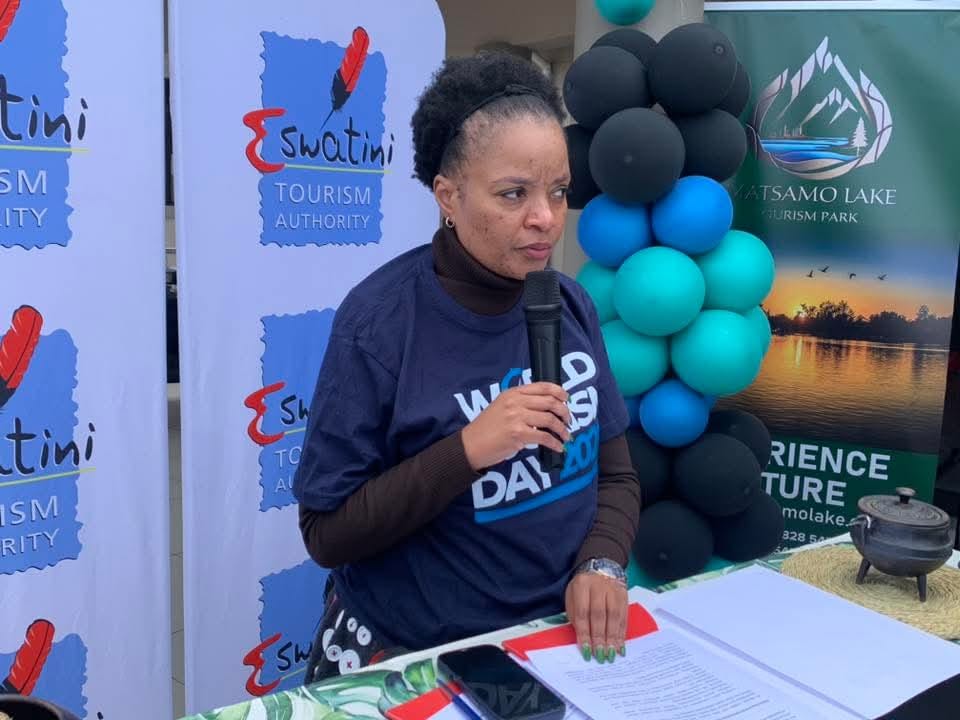
By Tlalane Dlamini
Eswatini’s tourism sector is shifting its corporate focus from mere recovery to a strategic mandate of “Sustainable Transformation,” committing to a growth model that emphasizes long-term value, good governance, and environmental resilience for future investments. This was the key message delivered at the World Tourism Day (WTD) celebration at Matsamo Lake Tourism Park.
The event, serving as a platform to set the national industry agenda, was led by Acting Principal Secretary Hlobisile Dlamini, representing the Minister of Tourism and Environmental Affairs, alongside leaders of the Eswatini Tourism Authority (ETA). They jointly declared the global WTD theme, “Tourism and Sustainable Transformation,” as a mandatory policy for all industry stakeholders.
The E2 Billion Corporate Goal
The ETA’s strategy up to 2027 sets clear, ambitious financial and operational targets, according to Board Chairperson Penelope P. Mkhwanazi. These targets aim to attract large investments and increase the sector’s role in the national economy:
• International Visitors: Attract over two million international visitors each year.
• Tourism Revenue: Increase sector revenue to more than E2 billion (Emalangeni) within the same period.
This ambitious objective is supported by recent strong performance. The Acting PS, representing the Minister, noted that Eswatini welcomed about 964,880 international visitors in 2024, a significant rise of around 14.5% from the previous year. However, she emphasized that “recovery alone is not enough”; growth must be smarter to ensure it “does not come at the expense of our environment, culture, or shared prosperity.”

The Case for Sustainable Investment
ETA CEO Vusie N. Dlamini and the Chairperson portrayed the shift to sustainability as a vital risk management and value-creation approach for investors, not just a regulatory obligation.
The CEO stressed that the new mandate aims to transform how growth occurs, ensuring resilience against future challenges, including environmental and climate change risks. The ETA’s plan explicitly involves building resilience (climate and environmental risk) into planning and employing data and research to guide all decisions, providing a steady, data-driven environment for investment.
The Chairperson assured the ETA of the agency’s commitment to strong governance and oversight, stating that investments will prioritize sustainability, and each project will be evaluated for its environmental and cultural impacts. She added that the ETA will track not only tourist numbers but also community wellbeing and ecological health, giving investors a full picture of long-term value.
Additionally, the Acting PS highlighted a key market driver: “To private industry: your role is central. Adopt sustainable practices—not just because they are good, but because visitors increasingly demand them.” This makes sustainability a vital competitive edge and a factor influencing consumer choices in the post-pandemic travel industry.

Strategic Focus Areas for Private Sector Investment
The ETA leadership identified several strategic pillars to guide future investments and partnerships:
Integrated Value Chain Development: The CEO indicated that ETA will work to integrate value chain development to ensure local suppliers, artisans, and craftspeople can access markets. This promotes authentic products, stimulates the local economy, and shares tourism benefits widely.
Sustainable Infrastructure: The government plans to develop tourism infrastructure—covering transport, border crossings, signage, waste management, and renewable energy in accommodations—all with sustainability at the core.
Community Empowerment and Custodianship: Both the CEO and Acting PS highlighted the essential role of communities, who are “custodians of our heritage, culture, and environment.” Involving communities helps preserve authenticity, promote sustainability, and ensure fairness, making local partnerships vital for successful, long-term projects.
In a final appeal, CEO Dlamini urged the private sector: “Invest in sustainability; adopt the good practices; see them not as costs but as long-term value.” The message clearly signals that Eswatini’s journey to E2 billion in tourism revenue will be built entirely on transformed, resilient, and inclusive growth models.
